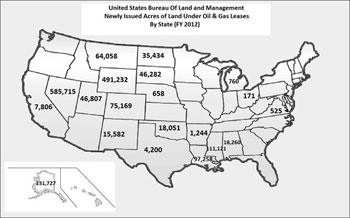Oil and gas drilling and coal mining on US public lands and waters could be responsible for 21% of US emissions, but incredibly, it is not even measured, much less included in our greenhouse gas totals.
And there is no plan to do so, according to Stratus Consulting, even though almost 30% of annual energy production comes from public lands. Why? Because those emissions are produced by private companies.
That’s another reason for banning fracking on public lands, instead of releasing weak regulations, as Interior just did.

Sadly, these exploitive, polluting industries are dwarfing our natural areas’ ability to absorb carbon, and thus lower US emissions. In 2010, public lands in the lower 48 states contributed 4.5 times more carbon to the atmosphere than they absorbed, according to research by the Center for American Progress.
What About All Those Pipelines & Exploding Trains?
Are you getting used to this situation? The US is producing so much shale oil that there’s no place to store it, and exploding pipelines and trains are becoming way of life.
With all the gas being produced comes more pipelines and more trains to transport it. A National Transportation Safety Board study of pipeline explosions shows that in the cases they examined, the cause was lax oversight by companies. They – and regulators – didn’t do inspections that would have uncovered the problems that ended up in explosions. There have also been instances where the companies were warned of potential problems but did nothing about it.
Since the investigation the Transportation Board has issued 28 recommendations to state and federal regulators, they say. Out of 298,000 miles of gas pipelines in the US, over half were built before 1970.
Read our article, Natural Gas Pipeline Leaks Get Some Attention.
Fossil Fuel disasters 2005-2014:

The report, Runaway Risks, finds trains carrying shale oil threaten 25 million Americans and routinely pass within a quarter-mile of 3,600 miles of streams and more than 73,000 square miles of lakes, wetlands and reservoirs, including 34 national wildlife refuges and critical habitat for 57 threatened and endangered species. Hundreds of thousands of gallons of crude oil has been spilled into our nation’s waterways.
In 2008, oil was transported on 10,000 rail cars a year, rising to over 400,000 in 2014, says the Center for Biological Diversity, which published the report.
And that’s not all. Companies commonly violate rules. Take Pennsylvania, where over 1000 wells have been reported for violations in the last few years, including spills and illegal dumping of fracking waste into rivers, and well problems that contaminated drinking water. And that doesn’t include air pollution.
Citizens Want Out
As you know, towns and cities in various parts of the country have passed fracking bans, but many of them are contested in court by the state, as in Colorado, Texas and Ohio.
Last month, Ohio’s Supreme Court ruled against municipalities that want to ban or restrict fracking, because state law trumps local ordinances. And guess what? The judge who wrote the majority opinion in the 4-3 ruling, received big campaign contributions form the oil and gas industry.
In Montana, seven landowners are going to court because the county rejected their petition to establish the "Silvertip Zoning District" to protect about 3,000 acres of land, which is encouraged under state law.
"State and federal laws don’t protect us from the worst impacts of oil and gas drilling," says a plaintiff. "There are few requirements for protecting our water or how far drilling must be set back from residences. This means we have to take local action to protect our way of life and our livelihoods."
Read Runaway Risks:

Current lack of enforcement ignores growing threats of Bakken oil
explosions so extensive and toxic, fire chiefs have testified that
“even if we had an infinite amount of foam,” the fires and toxic
emissions would continue until all fuel had been exhausted, killing
people and destroying wide swaths of land and riverbanks as they
burned. Railroads are making secret decisions and hiding documents to
such an extent, the federal Department of Transportation says it’s
“impossible to know” to what extent railroads have prioritized or
ignored safety in choosing routes. Railroads have also lobbied against
federal regulatory efforts aimed at retrofitting tank cars for greater
safety. Congress and the White House, Homeland Security and the FRA
need to address the danger of Bakken oil explosions before disaster strikes.
That’s why I signed a petition to Joseph C. Szabo, Administrator, Federal Railroad Administration, which says:
“It’s time the Federal Railroad Administration enforces existing law
requiring regulation to preserve health and safety in communities
adjacent to railroad traffic, particularly in metropolitan areas.
”
Will you sign the petition too? Click here to add your name:
http://petitions.moveon.org/sign/enforce-railroad-health?source=s.fwd&r_by=1718159
Thanks!